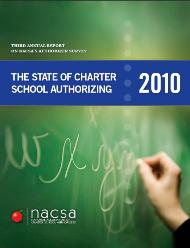 This third annual survey of charter authorizers from the
National Association for Charter School Authorizers (NACSA) is its largest to
date—and replete with interesting findings. For instance, the survey found that
charter agreements with lengthier terms—ten years, say, versus five—led to more
weak schools remaining open, since authorizers tend not to close schools mid-charter.
We also learn that large authorizers (in charge of ten or more schools) are likelier
to implement best practices than their smaller counterparts. And with roughly
700 authorizers overseeing only one or two schools each, questions of
authorizer efficacy and resource adequacy abound. Perhaps the most consequential
finding—and one that deserves additional study—is that authorizer oversight of charters
run by management companies (both nonprofit and for-profit) remains weak. This
is a key issue, especially in situations where incapacity at the
school-governance level renders the management company more powerful than the body
accountable for a school’s success.
This third annual survey of charter authorizers from the
National Association for Charter School Authorizers (NACSA) is its largest to
date—and replete with interesting findings. For instance, the survey found that
charter agreements with lengthier terms—ten years, say, versus five—led to more
weak schools remaining open, since authorizers tend not to close schools mid-charter.
We also learn that large authorizers (in charge of ten or more schools) are likelier
to implement best practices than their smaller counterparts. And with roughly
700 authorizers overseeing only one or two schools each, questions of
authorizer efficacy and resource adequacy abound. Perhaps the most consequential
finding—and one that deserves additional study—is that authorizer oversight of charters
run by management companies (both nonprofit and for-profit) remains weak. This
is a key issue, especially in situations where incapacity at the
school-governance level renders the management company more powerful than the body
accountable for a school’s success.
|
National Association of Charter School Authorizers, “The State of Charter School Authorizing: A Report on NACSA’s Authorizer Survey,” (Chicago, IL: National Association of Charter School Authorizers, January 2011). |
